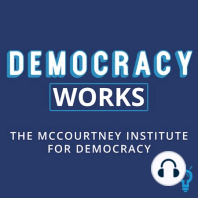32 min listen
Breaking the silence in Syria
FromDemocracy Works
ratings:
Length:
36 minutes
Released:
Sep 24, 2018
Format:
Podcast episode
Description
We’ve talked before on this show about the importance of a free press, but this week’s episode brings a whole new meaning to the term. In 2014, Abdalaziz Alhamza and his friends started social media accounts to document the atrocities being committed by ISIS in their city of Raqqa. They called themselves Raqqa is Being Slaughtered Silently (RBSS) and their work quickly grew into a website and a social movement that garnered international attention.
RBSS brought the work of citizen journalists to a global audience and helped provide a counter to increasingly sophisticated ISIS propaganda. Their work was chronicled in the 2017 documentary City of Ghosts. Aziz visited Penn State for a screening of the film sponsored by Penn State’s Center for Global Studies, which is lead by friend of our podcast Sophia McClennen.
ISIS was removed from Syra last year, but that does not mean life in Raqqa has improved. Aziz and his colleagues are now working to report on the Asad regime and militias who are trying to take power from it. They are also working to empower citizen journalists in other countries and help defend the free press at a time when “fake news” has become a rallying cry for authoritarian leaders around the world.
Additional Information
Raqqa is Being Slaughtered Silently
City of Ghosts documentary
Discussion/Reflection Questions
How significant do you think groups like Aziz’s were in pushing back ISIS?
Given their access to information locally in the city, do you think they are a better new source than a foreign outlet such as CNN?
What was your initial reaction with Aziz mentioned that friends and family had been killed while trying to do their work as citizen journalists?
Does what they went through and are still going through change your view of journalists?
Does listening to the struggles of Aziz and his organization change your perception of democracy in America?
Would you be willing to take on the challenges and risks of covering the actions of ISIS if you were in Aziz’s situation?
Interview Highlights
[5:50] What has happened in Raqqa since the end of the film?
Aziz: A campaign began to defeat ISIS. However, this brought with it a lot of violence. Nearly 80% of the city has been destroyed. Most of the people have been displaced. The media stoped paying attention once ISIS was pushed out of the city. This is why we kept out campaign going to continue to share information about the city. There are still a lot of things happening in the city. For example, people are still being killed every day. They are still finding bombs in the city. Also, they are finding mass graves at different parts of the city.
[7:29] How have the conditions there changed the work that you’re doing?
Aziz: We do have more freedom now, but we still can’t do our work legally because we’re considered terrorists by some. If we can survive ISIS, then we can survive working around other groups. We have started an online program to teach people how to become activists and how to start their own movements.
[9:10] What was your motivation for starting this movement?
Aziz: Before the revolution, I wasn’t involved with politics at all. When everything started, I had that thing inside that motivated me to get up and do something. We started by filming protests. When ISIS started taking control they prevented media from covering what was happening in the city. At this point, we felt we had a duty to do something since we were all from Raqqa. None of us had any journalist education at all. We got some training, but now we actually work to train others to be journalists.
[11:20] How do you manage still covering Raqqa while also trying to expand your coverage beyond the city?
Aziz: Cellphones are the magic. We can do most of our work remotely. They are both tools for communication as well as tools for learning stuff.
[12:46] What do you share with those you’re training to become activists themselves?
Aziz: We have gone through many mistakes getting to this poin
Released:
Sep 24, 2018
Format:
Podcast episode
Titles in the series (100)
How Democracies Die author Daniel Ziblatt on the ‘grinding work’ of democracy: Daniel Ziblatt has done a lot of interviews since the release of How Democracies Die, the bestselling book he co-wrote with Steven Levitsky. But we asked him a question he’d never gotten before — about a line toward the end of the book when he refers to democracy as “grinding work.” by Democracy Works
